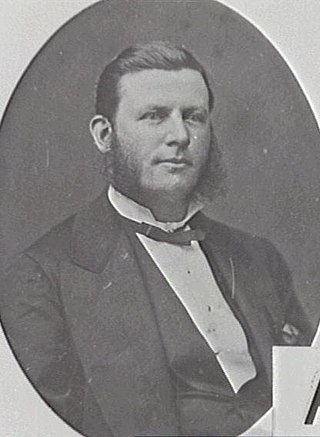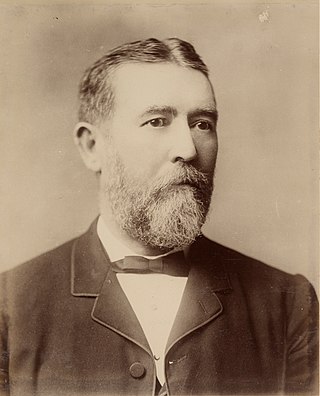Related Research Articles

Sir Joseph Palmer Abbott, was an Australian politician, pastoralist and solicitor.

Ninian Melville was an Australian politician in the late nineteenth century.
Members of the New South Wales Legislative Assembly who served in the ninth parliament of New South Wales held their seats from 1877 to 1880. The 1877 election was held between 24 October and 12 November 1877 with parliament first meeting on 27 November 1877. There were 73 members elected for 53 single member electorates, 6 two member electorates and 2 four member electorates. Premiers during this parliament were Sir John Robertson until 18 December 1877, James Farnell from 18 December 1877 until 21 December 1878 and Sir Henry Parkes from 21 December 1878. The Speaker was Sir George Allen.

Daniel O'Connor was an Irish-born politician and businessman active in colonial-era New South Wales.
John Ryan Brenan was an Australian politician and an elected member of the New South Wales Legislative Assembly for 68 days in 1856. He founded, and outlined, the suburb of Smithfield in Sydney. Furthermore, Brenan Park, which is in that suburb, was named after him.
James Dickson was an Australian politician and a member of the New South Wales Legislative Assembly from 1857 until his death.
The Donaldson ministry was the first ministry of the Colony of New South Wales, and was led by Stuart Donaldson. Despite the first free elections for the New South Wales Legislative Assembly being held in March 1856, it took over two months for Donaldson to form Government. It was sworn in on 6 June 1856, after the 1856 election and lasted just eighty days.

John Davies , was a member of the Parliament of New South Wales.

James Watson was an Australian politician, Colonial Treasurer of New South Wales 1878 to 1883.

Thomas Hungerford was a pioneer pastoralist and politician in Australia. He was a Member of the New South Wales Legislative Assembly.
Alfred Allen was an Irish-born Australian politician.

Hugh Taylor was an Australian politician.

William Turner was an English-born politician and miner in Victoria and New South Wales, Australia.
Northumberland, an electoral district of the Legislative Assembly in the Australian state of New South Wales was created in 1859 and abolished in 1913.
A by-election was held for the New South Wales Legislative Assembly electorate of West Sydney on 26 July 1890 because of the death of Alfred Lamb.
A by-election for the seat of Northumberland in the New South Wales Legislative Assembly was held on 26 May 1884 because of the resignation of Atkinson Tighe due to ill health.
A by-election was held for the New South Wales Legislative Assembly electorate of Queanbeyan on 27 January 1881. The election was triggered by the resignation of James Thompson, taking up the government position of Railway Land Valuator.
A by-election was held for the New South Wales Legislative Assembly electorate of Northumberland on 18 January 1882 because of the resignation of William Turner. Members of parliament were unpaid at the time. Turner was paid by a subscription, said to be £0.08 per member of the Reform League. Subscriptions however proved to be inadequate to support him and he resigned from parliament.
A by-election was held for the New South Wales Legislative Assembly electorate of Paddington on 20 February 1880 because John Sutherland resigned when his company accepted a government contract to re-roll railway rails.
A by-election was held for the New South Wales Legislative Assembly electorate of Northumberland on 12 February 1877 because Charles Stevens was insolvent. Stevens had left the colony on an expedition to recover valuable property, including 2,576 ounces of gold from the General Grant, which wrecked off Auckland Island.
References
- ↑ Ellis, Ian. "Hungerford, Thomas (1823–1904)". Australian Dictionary of Biography . National Centre of Biography, Australian National University. ISSN 1833-7538 . Retrieved 27 October 2014.
- ↑ "Mr Thomas Hungerford (1823-1904)". Former members of the Parliament of New South Wales . Retrieved 23 June 2019.
- ↑ "Writ of election: Northumberland". New South Wales Government Gazette . No. 132. 16 April 1880. p. 1807. Retrieved 1 June 2021– via Trove.
- 1 2 "Electorate of Northumberland". The Maitland Mercury and Hunter River General Advertiser . 29 April 1880. pp. 4–5. Retrieved 1 June 2021– via Trove.
- ↑ Green, Antony. "Index to Candidates: Copland to Crittenden". New South Wales Election Results 1856-2007. Parliament of New South Wales . Retrieved 1 June 2021.
- ↑ Green, Antony. "Index to Candidates: Ghalayini to Gorrick". New South Wales Election Results 1856-2007. Parliament of New South Wales . Retrieved 1 June 2021.
- ↑ Green, Antony. "1876 Liverpool Plains by-election". New South Wales Election Results 1856-2007. Parliament of New South Wales . Retrieved 1 June 2021.
- ↑ Mansfield, Bruce E. (1974). "Melville, Ninian (1843 - 1897)". Australian Dictionary of Biography . National Centre of Biography, Australian National University. ISSN 1833-7538 . Retrieved 1 June 2021.
- ↑ Green, Antony. "Elections for the District of East Sydney". New South Wales Election Results 1856-2007. Parliament of New South Wales . Retrieved 1 June 2021.
- ↑ Green, Antony. "1880 Northumberland by-election". New South Wales Election Results 1856-2007. Parliament of New South Wales . Retrieved 1 June 2021.